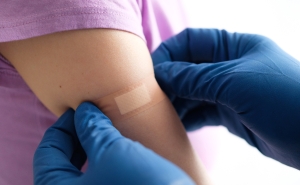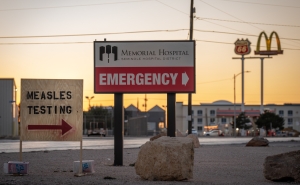Omicron in South Africa: The Latest News

INTERVIEW BY JOSH SHARFSTEIN
Nearly a month into the emergence of omicron, much more is known about its behavior in the real world—thanks in large part to the work of scientists in South Africa who quickly sounded the alarm when the variant appeared.
In this Q&A, adapted from the December 17 episode of Public Health On Call, Josh Sharfstein, MD, talks with HIV researcher Glenda Gray, MBBCH, president and CEO of the South African Medical Research Council, and epidemiologist Chris Beyrer, MD, Desmond M. Tutu Professor of Public Health and Human Rights, about how omicron was discovered, what we know about it now, and what it means for South Africa and the world. They also discuss the importance of protecting people who are immunocompromised—including those with HIV—to help get the pandemic under control.
This variant was first recognized in South Africa. How did that happen?
GG: It was identified in an area near Johannesburg and Pretoria. A private laboratory that does PCR testing picked up on one of the tests an “S-gene target failure”—an anomaly in their testing strategy. This continued in several tests. They notified the virologists who do surveillance in our country and sent the samples for sequencing, [which revealed] a lot of mutations and deletions.
The new variant came as a surprise, and over a two-week period, we saw it rapidly become the predominant variant circulating in the Gauteng area. Initially, we thought it was a breakout amongst university students, but community transmission fueled the wave in South Africa.
What does this say about South Africa’s capacity for identifying a signal and then being able to investigate?
CB: We are all deeply in the debt of the South African scientists and public health system for identifying this early. In pandemics, time really matters. There's been a long-standing collaborative investment— principally around HIV, but also TB and other conditions—in laboratory infrastructure that has made South Africa a critical scientific partner in research and vaccine trials. Their ability to do molecular surveillance, pick up new variants of COVID, sequence them, and understand at a population level the emerging epidemiology, is critically important.
What have you learned since the identification? What kind of surveillance, monitoring, and understanding has resulted?
GG: The first time the virologists looked at the new variant, they were horrified [by] its mutations. There was concern about how this virus works against the vaccines that we have. The scientists raised the alarm to alert our country, our president, and minister of health that there was a new variant, and publicly shared this with WHO and the international community.
We have teams [conducting] hospital and genetic surveillance, teams monitoring vaccine effectiveness, and teams modeling the reproductive rate. We’ve all worked together to answer questions for South Africa and the global community. We’ve held regular meetings with the NIH to give them up-to-date information. We’ve rapidly worked to establish vaccine effectiveness, and whether to bring in boosters earlier and more frequently.
What have you found through that collaboration?
GG: In South Africa, we’ve seen a delinking of cases from hospital admissions. With the delta variant, the hospitalization rate links closely to the case rate. When we look at the omicron surge, we have more cases compared to hospital admissions. In South Africa, there are fewer hospital admissions, fewer deaths, and ICUs are under control.
Two thirds of hospital admissions are unvaccinated. We don't want to speculate on the virulence yet; we're not sure how this virus will perform in areas with low vaccine coverage, or areas that have kept SARS-CoV-2 out [where people have therefore not been exposed][MH1].
In other words, omicron has spread very rapidly, but has not put the kind of pressure on the South African health care system the delta variant did in India, South Africa, and other countries.
GG: When we had delta, there were more hospital admissions. We had cases of delta where people were waiting in their cars outside the hospital, waiting for oxygen, waiting in ambulances. There were not enough ICU beds or ECMO machines.
What does this tell you about the rest of the world, and potential differences between South Africa and other countries?
CB: There's evidence that the omicron variant is spreading. South Africa is a large country and an important place of commerce, labor, and movement across that region. The rates of immunization in several neighboring countries and across the continent are significantly lower than in South Africa. South African vaccine coverage is around 35%. They have been using Johnson and Johnson and Pfizer’s mRNA vaccine, which have high efficacy. Much of the rest of the continent has under 10% immunization coverage, so it's hard to extrapolate what you're seeing in South Africa to other countries. We hope that [the current trend] holds and that the severity is not as marked.
The U.S. and Europe are still in a delta surge. Our hospitalizations and deaths are about 1,300 a day. We have a much higher overall immunization rate of about 62%. It still has not been enough to protect against delta, and it means that there are many susceptible people for omicron.
Do we have any early evidence from South Africa about the potential value of vaccination for protecting against this variant?
GG: We have some preliminary information showing that omicron does reduce the Pfizer vaccine’s effectiveness against COVID infection. What’s more important is how Pfizer protects against severe disease resulting in hospitalization and death. The results we have are encouraging. Vaccine effectiveness for Pfizer is around 70% protection against hospital admission as compared to unvaccinated people. We believe a booster is going to help increase vaccine immune responses and up the vaccine’s effectiveness.
You're looking at real-world experience and seeing a significant drop in hospitalization for people vaccinated with just two doses of the Pfizer vaccine.
GG: While we do see breakthrough infections, these infections are mild and have not translated at this stage into severe disease. We've had no deaths [among vaccinated people] attributed to omicron. We were reassured that parts of the immune system, like CD4 and CD8 T cell responses, are still showing that the vaccine can protect against death and hospitalization.
After the variant was identified in South Africa, travel restrictions were placed on the country and surrounding countries. Those restrictions are still in effect, even as omicron has been identified in many places in the world.
CB: In the first year and a half, [the U.S.] focused on zero-COVID strategies and trying to use travel restrictions to prevent importation. We saw that delta was a significantly more infectious variant, and those strategies didn't work. When the U.S. administration imposed the travel ban on the nine southern African countries, South Africa and its neighbors, they explicitly said, “This is not going to protect us from the introduction of this variant. It's just to buy time.”
Of course, it failed. This variant is approximately twice as contagious as delta, which was already substantially more infectious than the earlier variants and the original parent virus. We knew right away that this approach was not going to hold. We have repeatedly seen policymakers, decision makers, and governments jump to look like they're doing something meaningful to respond, and we get stuck with restrictions that do not have any scientific relevance.
From a public health perspective, it is nonsensical. It’s important to understand that these travel bans and restrictions don't necessarily contain highly infectious variants, but do have big impacts on economies and people's lives. They are, in a sense, prolonging the economic and social impacts of the pandemic more than they are affecting public health.
GG: Three million people have lost their jobs, mostly women. Restaurants, the tourism industry, the hotel industry have taken a severe knock. Closing down our summer season and preventing people from coming into our country is devastating to our economy. We’ve been punished for being honest and for alerting the world that there's something new happening. This kind of action may deter other scientists in other countries from being transparent about the epidemic in fear of losing critical trade. We don't want to drive information underground. The way to manage pandemics is transparency, communication, and information sharing. You don't manage pandemics by impeding the movement of people.
How do you see the interaction between COVID and HIV in South Africa?
GG: South Africa is heavily burdened by HIV. We have about 8 million people who are infected with HIV, and although we have the largest antiretroviral treatment (ART) program in the world, at least a third of individuals with HIV aren't on ART and are immunocompromised. People who are HIV positive, particularly those who aren't on ART, are more likely to die or be hospitalized from COVID.
In South Africa, the biggest cause of immune suppression is HIV. People who are immunosuppressed are likely to shed the virus longer. They are not likely to mount a good immune response against the virus, and this makes the evolution of the virus more likely. We need to protect people with HIV from dying from COVID, and we need to use both ART and vaccinations to do this.
What is imperative for people with HIV as a result of the pandemic?
CB: For people living with HIV, getting ART and achieving viral suppression is fundamental to their well-being. It also reduces their risk of transmission. It is a challenging situation to have so many people in Africa living with HIV and untreated.
What's emerged with COVID-19 is that people who are immunocompromised need prioritization for COVID immunization and treatment. They are at risk of being unable to clear the virus and for viral mutation than to continue in their systems. We think this is fundamental to how new variants of concern emerge. The data we have suggests that most of, if not all, new variants have emerged in people who are immunocompromised. For these people, three full doses are recommended. What omicron suggests to us is that everyone who isn’t vaccinated needs to get immunized and that boosting is important.
Joshua Sharfstein, MD, is the vice dean for Public Health Practice and Community Engagement and a professor in Health Policy and Management at the Johns Hopkins Bloomberg School of Public Health. He is also the director of the Bloomberg American Health Initiative and a host of the Public Health On Call podcast.





